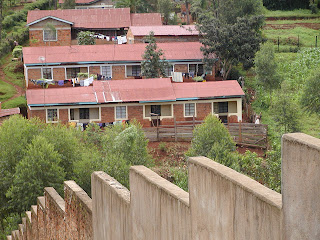I have written before about visitors to Kenya speaking Swahili, and as I continue to visit, I learn more about what gives a mzungu street credibility. And it depends on where you are.
I spend most of my time in Kisii, which is situated in SW Kenya. Although it is quite a big town, it is off the regular tourist track and white people are few and far between.
It is rare to be greeted with "Jambo" in Kisii. Usually, you would be greeted with "Habari?" which means, "How are you?", to which the reply is "Mzuri" - "Fine" or "Mzuri sana" - "Very fine". Of course, if you ask a Kenyan, "Habari?", you could get the answer, "Very OK."
Youngsters love sheng, a sort of slang mixture of Swahili, English and whatever their tribal language might be. So, I usually greet younger people with "Mambo" - "What's up?" This surprises most people as I am white and am speaking a "language" that is normally reserved for Kenyans. The reply is usually "Poa" (Cool) or "Safi" (clean).
Even the youngest of children in provincial Kenya speak some sheng.
On the Coast, where there are far more whites, either tourists or residents, Jambo is the usual greeting, to which the reply is also Jambo. The same seems to goes for Nairobi.
But, as I spend most of my time in Kenya in the Kisii district, wherever I am, I greet people with "Habari?" or "Mambo".
It certainly gives a mzungu some credibility when they speak any Swahili, but to use a greeting other than Jambo earns them a couple of extra points.
There are a few peculiarities you may come across in Kenya. A cigarette is a stick, and the smoker may "drink" it.
I mentioned "Very OK". This is a phrase that I find myself using now, even in the UK. It raises a few eyebrows over here.
I have also mentioned before the use of "Sorry". People will say sorry if you have a mishap, even if they are not the cause. It is not an apology, but showing empathy for your discomfort. It takes a little getting used to.
Kenyan English is a wonderful language, but don't translate it literally into UK English - it doesn't always work!


